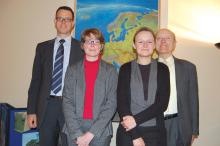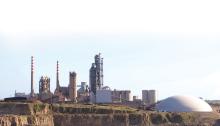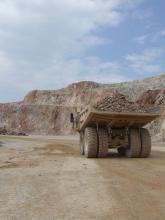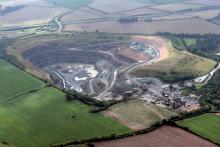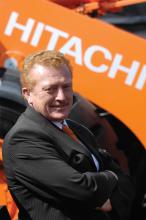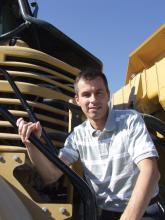
Having recently rejoined Case after a gap of eight years, Israel Celli talks to ABE about his new role, the recession and plans for the quarry market
Few people return to a company once they have moved on and even less can be coaxed out of retirement to rejoin. But that is exactly what Israel Celli did when he returned to
Brazilian-born Celli was appointed as vice president of sales and marketing for the European region in 2008 - eight years after he originally left the company and more recently retired. Nonetheless, it is clear that Celli has a real passion for the construction equipment sector and, through his career in Latin America, thrives on the challenge of working in difficult economic conditions.
Celli previously worked for Case based in Brazil from 1996 to 2000, but before that he had a 20 year career with IBM. He has worked in Europe almost since he last left Case - he left to head up JLG in Latin America and in 2002 moved to the Netherlands to manage JLG's international operations and took the company from US$200million turnover in 2002 to US$1billion when he left in 2008.
When he left in March 2008 he officially retired but he was tempted back into the industry by this new opportunity to rejoin Case Construction. "There was a sense of honour with the chance to return," said Celli.
Since rejoining he has been visiting customers and territories, a task he considers very important. "I am definitely not a desk-jockey but the need to get familiar with Case and the current financial situation has prevented me from travelling in the way I would like,"
he said.
Celli has also been meeting with dealers over the last few months but the company also brought dealers from Europe, as well as from Africa, Middle East and the CIS together in France during
"The relaunched centre will continue to provide training but it will also be a customer orientated centre that makes the most of the local French culture to display our entire product lines in a 'theme park' style where customers can trial equipment. The site will also include a heritage museum." Case's growing strength in the quarrying sector is something he is keen to promote. The company recently unveiled improved versions of its 70tonne CX700B and 80tonne CX800B at Intermat and also struck a deal with
"In the last 10 years the company has moved more into the heavy equipment market with the acquisition of
Celli would not reveal the company's targets in this area, but did say that currently only 5% of Case's revenues come from the European quarry market. "We estimate that in 2008, the European quarry market bought 5500 items of new equipment," he said. "While we expect this to be lower in 2009, the focus in quarries is far more long term so is likely to soften rather than drop significantly as operators look to delay some investment rather than completely cancel. We also expect quarrying to be one of the first markets to recover as raw materials are always needed for construction and almost every country has some quarrying activity, but wherever you go the basic loading and hauling needs are similar. This makes it a very attractive business." Developing Case's quarrying market, along with other construction applications, is a key part of Celli's new role and one which his past career places him well him well to cope with, particularly in the current economic climate.
"IBM was a very good school for learning management procedures and regulations. It gave me the chance to learn from a corporate global company," said Celli. "There was an open door policy at IBM that allowed you to escalate an issue if you didn't feel your direct manager was dealing with it. This created an atmosphere of respect for your colleagues and bosses and the 'respect for the individual' culture is something I have tried to cultivate wherever I have worked since.
"The whole aim was to work as a team or network and not as individuals. But it also gave me the view that the doors were always open for me because of my business style and knowing when to take the hard line and when not to. My approach is that you win together and you lose together." It is also his experience of working in what is now an emerging market, but was once a very challenging market, that stands him in good stead to today's conditions.
"I have worked through a number of recessions in Latin America so the current situation is not as daunting to me as it may be to others," he explained. "But the current economic climate is the hardest and probably the worst recession I have seen - overall the construction equipment industry is around 62% down in the first quarter compared to last year. I am not expecting a pick-up for six months - it will be more a case of a slowing of the drop to around 50% of 2008 levels.
"The readjustment will take the industry back to 2002 levels, which were thought to be good at the time but we have seen almost unprecedented continuous growth since then. This unprecedented growth has not just been in the Eurozone but also in the US and BRIC countries and it is this global growth and then global recession that makes the current economic climate so different from any this industry has experienced before.
"Having grown up and started my career in a third world country, I heard time and again the rest of the world lecturing Brazilian and other Latin American industries not to depend on government subsidy to survive. Now the big global economies are doing a U-turn and trying to renationalise capitalist businesses. The global rebounce is dependant on government intervention for banks and insurance companies and now the car industry. Yet when the various US airlines were in difficulty five or six years ago, there was no bail out.
"The boom and bust business cycle in Latin America is much more of a roller coaster and we are masters of crisis management - dealing with cash flow with 60 to 70% inflation in one month forces you to be. That does not mean that I am not uncomfortable about delivering results though, but I am confident that a return will come and 2010 will offer more clarity.
"Everyone forgets that this is a cyclical business and with a longer period of growth, there must be a larger correction than in the past. The greatest contribution of the recession is that it teaches lessons and the survivors will be in better shape at the end.
"Over the last two or three years the industry has not been selling but just taking orders as there was no time for the conventional approach. Now there is time to build the correct structure." This is a challenge that Celli clearly thrives on and seems determined to deliver. What exactly this will mean in terms of new equipment for the quarry market, however, Celli remains firm lipped but added, "The quarry market is an important element of the future plans for Case."

